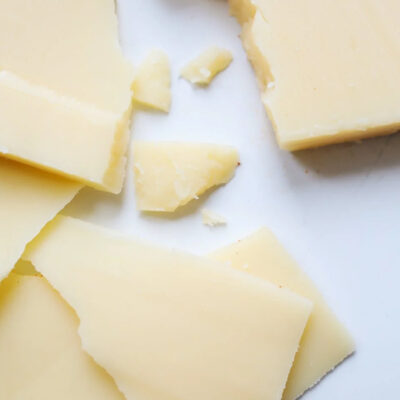Yes, parmesan cheese is safe for your dog to eat in small amounts, as a treat. However, it is important to keep in mind that cheese is not an essential part of a dog’s diet, and it should be given in moderation.

Safe: This food is generally considered safe by the veterinary community. Dogs can eat this food sometimes or in small amounts but contains little to no nutritional value.
Is Parmesan Cheese Good for Your Dog?
Parmesan cheese, also known as Parmigiano-Reggiano, is a hard, salty cheese that is commonly used as a topping for pasta, salads, and pizza. It is made from cow’s milk and has a sharp, nutty flavor. But is it good for your dog?
| Food Safety | Safe |
|---|---|
| Nutritional Value | None |
| Potential Risks | High Fat and Sodium |
Like all cheese, parmesan cheese is high in fat and sodium, which can be harmful to dogs if consumed in large amounts. A small amount of parmesan cheese as a treat is unlikely to cause any issues, but it is important to monitor your dog’s reaction to the cheese and to watch for any signs of digestive upset.
In addition, it is important to remember that parmesan cheese is not a substitute for a balanced diet. Dogs should primarily be fed a diet of high-quality dog food that is specifically formulated to meet their nutritional needs.
What You Should Know Before Feeding Your Dog Parmesan Cheese
If you do decide to give your dog parmesan cheese as a treat, make sure to choose a brand that does not contain any additives or preservatives, as these can be harmful to dogs. It is also a good idea to avoid giving your dog any flavored parmesan cheese, as the added spices and seasonings can be harmful to dogs.
Consult a Professional Veterinarian
Overall, while parmesan cheese can be safely given to dogs as a treat, it should be given in moderation, and should not be a regular part of their diet. As always, consult with your veterinarian before introducing any new foods to your dog’s diet.
Frequently Asked Questions
-
No, garlic is toxic for dogs, as it contains thiosulfate.
-
Cheese is generally safe for dogs to eat in small amounts as an occasional treat. However, it is high in fat and sodium, so it should not be fed to dogs in large quantities or as a regular part of their diet.
As with any treat, it is important to feed your dog parmesan cheese in moderation. A general guideline is to offer no more than 10% of your dog’s daily calories from treats. For a small dog, this would be about 1/4 to 1/2 teaspoon of parmesan cheese per day. For a larger dog, you could offer up to 1 teaspoon per day. It is always a good idea to consult with your veterinarian before adding any new food to your dog’s diet.
-
If your dog eats a large amount of parmesan cheese, it is important to monitor them for any signs of digestive upset or other adverse reactions. Common symptoms of digestive distress in dogs include vomiting, diarrhea, loss of appetite, and abdominal pain. If your dog experiences any of these symptoms after eating a large amount of parmesan cheese, you should contact your veterinarian for further advice.
It is also important to keep in mind that parmesan cheese is high in fat and sodium, which can be harmful to dogs if consumed in large quantities. Overconsumption of fat can lead to pancreatitis, a serious condition that can cause abdominal pain, vomiting, and diarrhea. High levels of sodium can lead to electrolyte imbalances and dehydration in dogs. If you are concerned that your dog has eaten a large amount of parmesan cheese, it is a good idea to contact your veterinarian for guidance.







